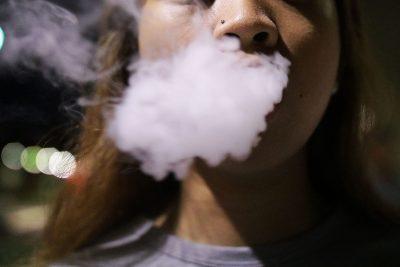
While Massachusetts’ temporary ban on the sale of all vaping products is ending Wednesday, vape and tobacco consumers still won’t be able to purchase flavored vape products.
The ban will be replaced by a permanent law passed by the state legislature banning the sale of all flavored nicotine vaping products, which takes effect immediately. The law will also ban the sale of menthol cigarettes and flavored chewing tobacco, effective June 1, 2020.
“When enacted, these permanent regulations will ensure that risks are known to consumers, will clarify what interventions [the Department of Public Health] can take to address clear risks identified by the developing science,” Baker said in his announcement, “and will ensure sellers are not skirting the new law and selling to kids.”
Only flavored tobacco products sold and smoked on site at licensed smoking bars will be allowed once the law takes effect.
Additionally, the new legislation bars the sale of vaping products that have a nicotine content exceeding 35 milligrams per milliliter to adult-only tobacco stores and smoking bars with valid licenses.
Vaping products that are not flavored and contain less than 35 milligrams per milliliter of nicotine can still be sold in retail stores such as gas stations and convenience stores that are licensed to sell tobacco products.
Also to take effect June 1 is a 75 percent excise tax levied on the wholesale price of e-cigarette and vaping products. The excise tax is in addition to the existing 6.75 percent sales tax on goods in Massachusetts.
The new legislation is intended to reduce recent years’ spike in vape use among youth, according to state officials. Flavored tobacco products target appeal to younger demographics and are related to the increase in underage vaping, according to a press release from the governor’s office.
Tobacco control expert and public health Professor Michael Siegel said he believes the ban on flavored tobacco products will not cause a decrease in youth vaping but rather push them to seek other avenues through which to purchase vape products, such as black markets online.
“I don’t think it’s actually going to result in a decrease in youth vaping, I just think it’s going to result in a change in what youths are vaping,” Siegel said. “And unfortunately, I think that they’re going to transition more toward THC vaping and those are exactly the products that are causing this respiratory disease outbreak.”
Baker declared a public health emergency in September following cases of severe lung disease linked to vaping and e-cigarettes in Massachusetts.
The sweeping vape ban, according to Baker’s administration, was put in place to give scientists time to further research how vape is linked to lung disease.
Siegel said in the months since the sweeping ban on vaping products, cigarette sales have increased.
“For these last three months, there’s been no sales of vaping products allowed,” Siegel said. “In that short time, we’ve already seen an increase in cigarette consumption.”
E-cigarettes and vaping products are key to smoking cessation among adults, Siegel said.
“I think this law is going to have a negative impact on the overall public health,” Siegel said, “because it’s going to cause many ex-smokers to go back to smoking.”
Shamari Leary, 19, of Jamaica Plain said while she does not personally vape, she believes the ban will be ineffective in stopping those who do.
“I think the ban just makes people get that stuff in other, illegal ways,” Leary said. “I feel like if people are looking to vape, they’re going to find a way, either online or from shady people.”
Diane Bowley, 35, of Dorchester said she thinks the legislation is a positive step toward reducing the risks linked to vaping.
“I think that if vaping is linked to lung cancer similar to cigarettes,” Bowley said, “then it’s good that Massachusetts is trying to do something to reduce health risk.”
Alexander Ferreiras, 20, of Allston said he believes such bans do not tend to reduce unwanted behavior.
“These kinds of bans just push people to black market stuff,” Ferreiras said, “and spaces where the vaping products they’re getting are unregulated and could even lead to more dangerous effects.”






















































































































